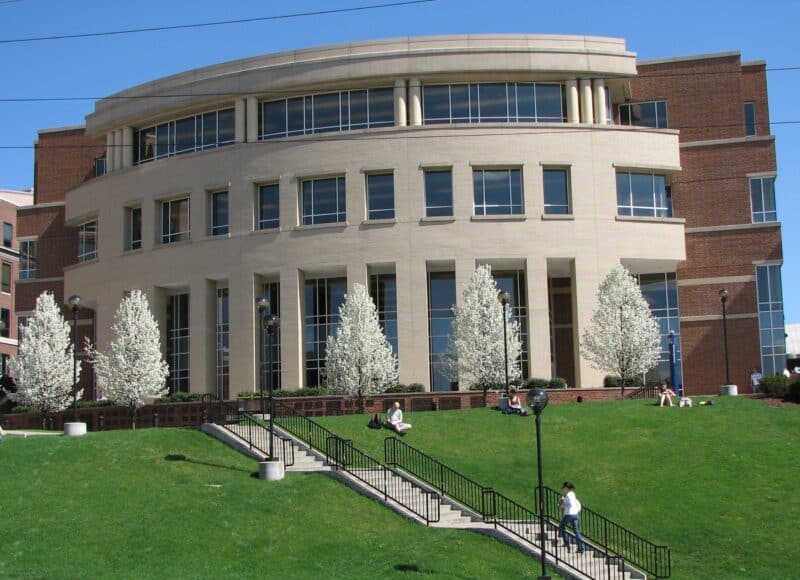Librarians Investing Ahead: An Interview With Megan Heady
Making the most of what we have. Meeting needs in a different way. The new mantras of academic librarianship reflect the ongoing squeeze of budgets and resources across the globe.
Read this short introductory post to learn more about Librarians Investing Ahead.
Megan Heady is the Director of Knowledge and Resource Management and the Associate University Librarian at West Virginia University. She kindly agreed to talk about how her library is taking the initiative to meet modern research and teaching needs. The interview was conducted by Gold Leaf’s Linda Bennett.
Linda Bennett: Could you tell us a little more about West Virginia University?
Megan Heady: West Virginia University (WVU) began life as West Virginia Agricultural College in 1867. It is a public land grant university, which means that it was designated by the state to receive the benefits of the Morrill Acts of 1862 and 1890, confirmed by the Equity in Educational Land-Grant Status Act of 1994. There are more than 100 similar institutions in the United States, and they were granted their land and status on condition that they focused on the teaching of practical agriculture, science, military science, and engineering – although “without excluding other scientific and classical studies”. West Virginia has almost 25,000 full-time students and teaches all subjects, though there is still a strong focus on business, engineering and the health sciences. It has a teaching hospital and is the only university in the state with a law school. It has a strong research tradition and became an ‘R1’ research university about ten years ago.
LB: Librarians across the world are experiencing budget squeezes at the moment, but libraries in the US, despite their historically large budgets, are for political reasons probably suffering more uncertainty than elsewhere in the world. Could you tell us what your main budgetary challenges are and how you address them?
MH: The university has suffered. In the last fiscal year we had to manage a $45m structural deficit and a wide variety of measures were taken. This included reducing the number of faculty and staff, cutting some programs, merging some of the schools and reducing library expenses. It meant laying off some library staff and cancelling many subscriptions to journals and databases. We restructured the library to accommodate the lower staffing levels and identified the core services and functions we should prioritize.
“We restructured the library to accommodate the lower staffing levels and identified the core services and functions we should prioritize.”
We also changed some of our activities to reflect open access policies – the restructuring increased our commitment to OA. We collaborated with the WVU Research Office to address National Institutes of Health recommendations and the Nelson Memo, which says that any publicly-funded researchers must publish both their research results and the accompanying data via a public access site, with no embargo. It changed how the library addressed research. Making data management plans certainly increased our workload, but we were keen to comply.
LB: Universities and their libraries in the US engage much more in fundraising than in other parts of the world. Are you able to describe some recent fundraising activities?
MH: We seek donors to participate in our projects and help sustain and advance the work of the library. For example, the library’s West Virginia and Regional History Center, which includes Archives and Special Collections, received $1.4m estate gift from a late university professor. The fund’s purpose is to collect, preserve and provide public access to library materials that honor the history and culture of West Virginia and the Appalachian region. We also recently received a large gift to be used at the Dean’s discretion and it has been dedicated to professional development for librarians and other library staff.
“Working with publishers on AI license clauses is a new challenge.”
In addition to fundraising throughout the year, the university has an annual day of giving. During the 2025 Day of Giving, the library’s West Virginia Feminist Activist and Women’s History Collection fund raised $10,000 and the library overall raised $84,621.
LB: What are the challenges that you face besides financial ones, particularly in your relationships with publishers?
MH: Specific publishers’ business models for purchasing eBooks can be challenging. This is especially true for eBook course reserve requests if the publisher will only offer an ebook for single-access use, as part of a package or subscription, or doesn’t make it available for libraries to purchase at all. Filling requests for streaming media can also be hard depending on the purchasing model, but we can usually resolve these by buying the DVD: while not ideal for our students, we are still providing access to the film.
It’s also interesting to see the developments around AI and the new challenges those will bring. Some publishers have started offering an AI add-on for their databases for improved searching, but there is often an additional cost attached to this, and we haven’t added any that charge a separate fee. Working with publishers on AI license clauses is another new challenge.

LB: What are your future plans for developing the library and its services?
MH: We will continue to build on our more streamlined approach. Before our restructuring, we had subject librarians who made collection decisions, but we now have one position dedicated to collection development for our general collections. We also created a new position, Associate Dean for Collections, who will oversee general collections, archives, special collections and the medical history museum. Our former subject librarians now serve in functional roles and are located in two new units, one based on research services – such as data management, planning and visualization, scholarly communication, evidence synthesis, grant funding and intellectual property – and the other on instruction.
We’re in the process of implementing a new digital repository for digital collections, working with a consortium on Hyku, an open source system. All these new initiatives are about meeting needs in a different way.
LB: Would you like to tell readers a little about yourself? How long have you been a librarian?
MH: I haven’t always worked at West Virginia University. I’ve been a librarian for nineteen years and I started my career in public libraries. Public libraries in the USA are much more challenged now than they were then, due to book banning efforts, legislative changes, and proposed loss of federal support.
I didn’t need a new qualification in order to transfer to university librarianship – the main specialist qualifications needed in this country are for school librarians and some subject specific roles (for example, if you want to become a law librarian). I started in access services at the WVU health sciences library, then moved to the law library and finally to the main library. In my current position I am responsible for the department overseeing acquisitions, electronic resource management, metadata, collection development, gifts, and government papers. I’m still learning and still growing with the job, which is constantly changing – for example, OA is changing how collection development works – and am happy in my current role.
“I hope that some of the friction felt between publishers and librarians can be improved upon – we rely on each other and I think that cordial partnerships are important to both.”
LB: What do you think will happen to academic libraries – and, by extension, higher education – in the next three to five years?
MH: I’m not good at predicting the future, especially in this time of great change! I don’t know what will happen to higher education, aside from the changes that have already been made on the federal level. Owing in part to student disillusionment with higher education – and the debts it incurs – and partly to the falling birthrate, we’re already dealing with decreased enrolment. Some small schools and colleges are merging or closing altogether.
I think university librarians will still be here in the future, still maximizing on what they can achieve. Academic librarians have a strong history of collaboration and working through consortia is a big part of this. I hope that some of the friction felt in certain quarters between publishers and librarians can be improved upon – we rely on each other and I think that cordial partnerships are important to both.
LB: Megan, thank you very much for your brilliant thoughts and insights.
You might also be interested in this blog series
[Title Image by Via Tsuji/Flickr. Some rights reserved.]
